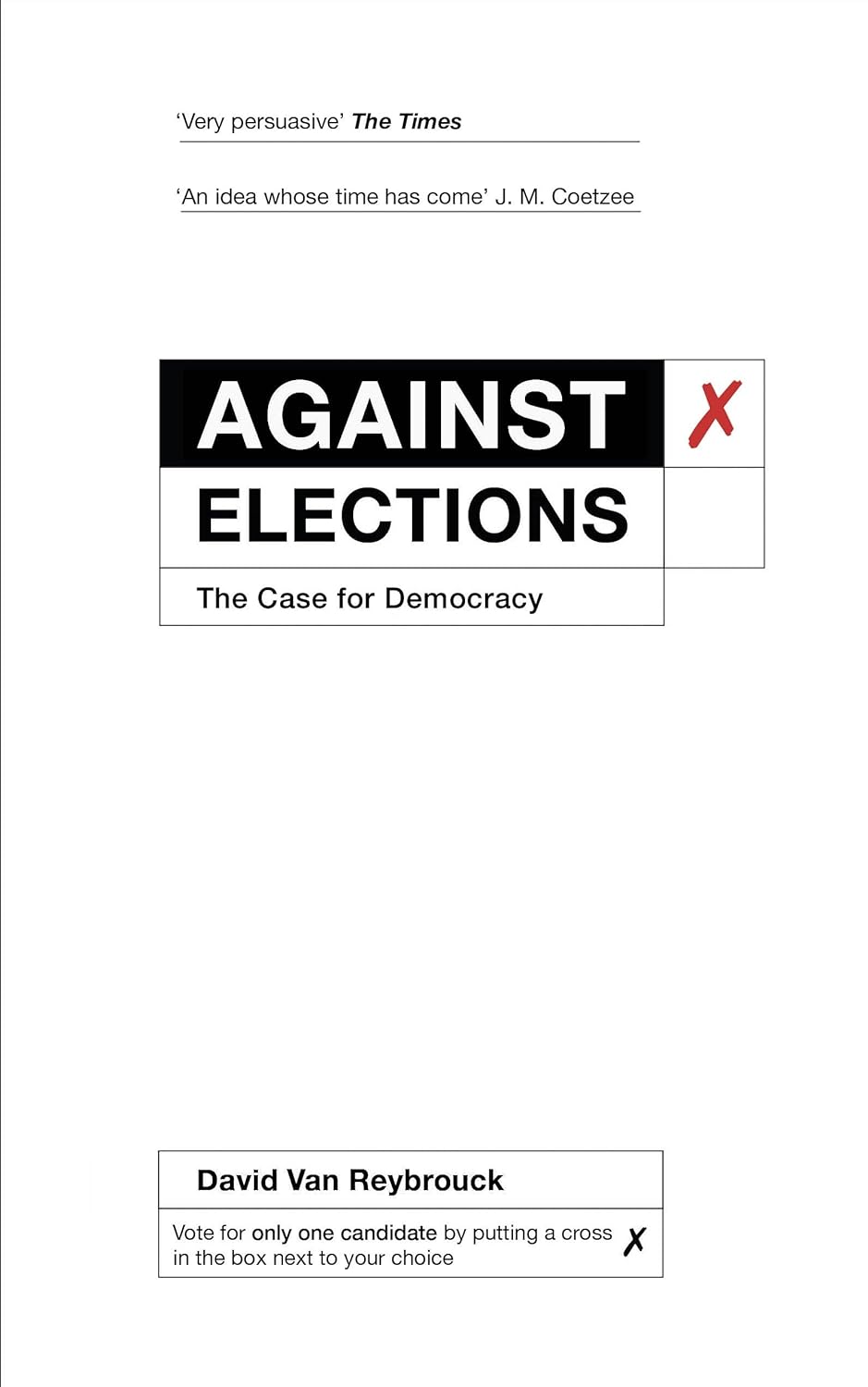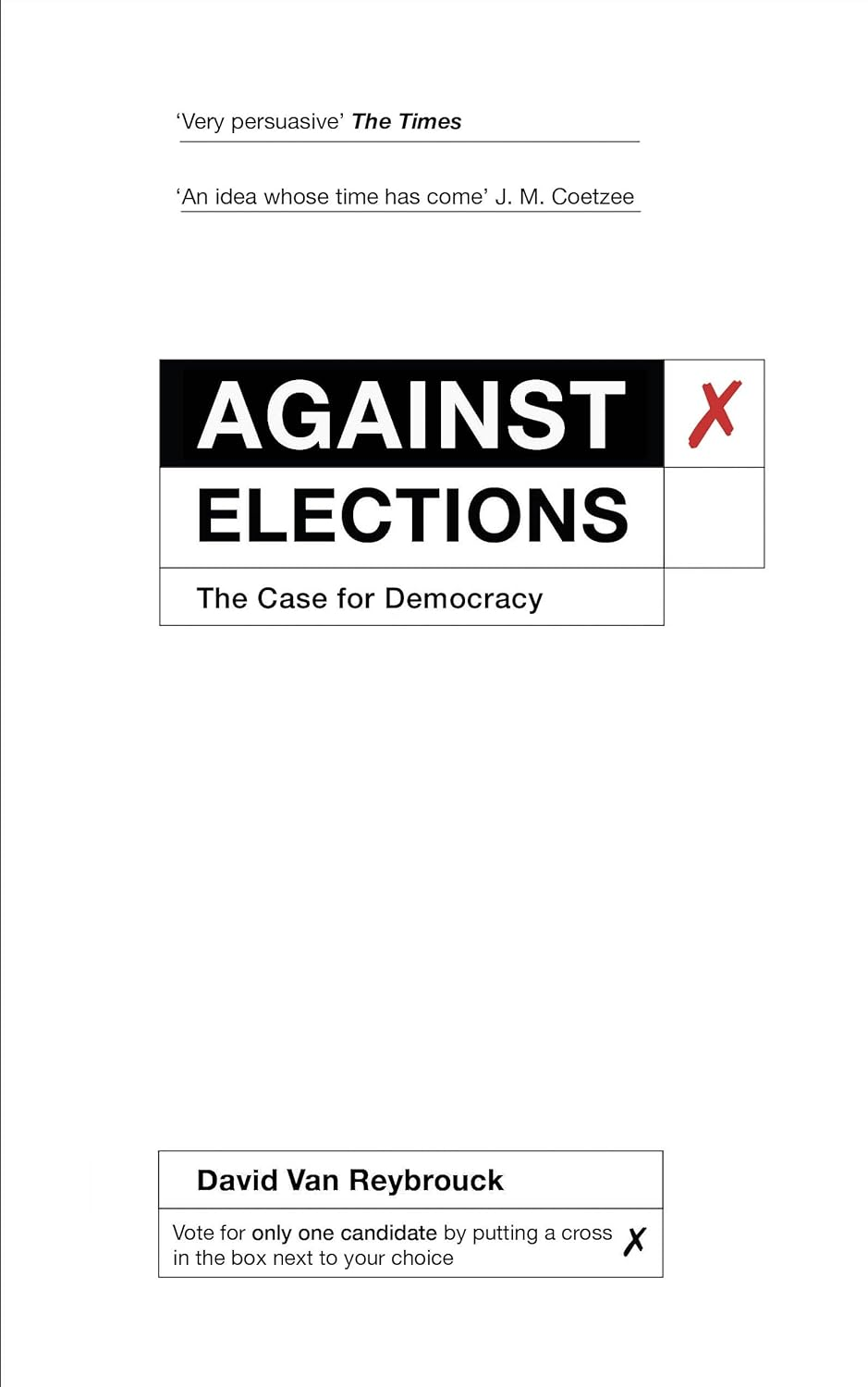David Van Reybrouck: Against Elections: The Case for Democracy


David Van Reybrouck, Against Elections: The Case for Democracy (Random House, 2016)
It wasn’t terribly long ago, just 1999, that recently anointed Nobel Laureate, Amartya Sen, wrote a celebrated essay (“Democracy as a Universal Value”) according to which the spread of democracy in the 20th Century was perhaps the most important device for human betterment since the domestication of cud-chewing mammals. In Sen’s view, democracy–something he took to include most elements of classical liberalism–even prevents famines. Surely, Sen sang, nothing else during that period can be justly claimed to have delivered the miracles accomplished by the proliferation of democracy.
Well, in his Against Elections, written fewer than 20 years later, David Van Reybrouck takes a very different view. He says that over, roughly, the last quarter of the 20th century and the first years of the 21st, people living in Western democracies, whatever their individual level of political effort or interest has been, have begun to realize that democracy hasn’t done much for them at all. Majorities haven’t gotten what they’ve clearly indicated they’ve wanted, and minorities have been blatantly abused. Only those with a lot of money or connections have made out well–and they’ve done so time after time. Nearly everyone else has been ignored at best and suffered otherwise. The recognition of this situation has led to what Van Reybrouck calls “Democracy Fatigue Syndrome”: a disturbing feeling that it is pointless to bother campaigning, protesting, or even voting. In fact, since not just elections but also media outlets can’t be trusted due to their reliance on powerful corporate and other moneyed interests, exhausted citizens have quite reasonably begun to wonder why they should even try to learn about what’s going on around them in the public realm.
Reybrouck takes the three most common diagnostic/remedial suggestions in the literature for treating this syndrome to be:
(1) It’s the fault of traditional politics, which should be replaced by populist governments with leaders who can directly translate the wishes of “the people” into sound policies absent the intervention of elitist-run, rule-obsessed parliaments or their careerist members.
(2) It’s the fault of democratic inefficiency, voter stupidity, and related frailties, so the current “slow and long-winded” decision-making that is unalterably infected by moneyed interest groups must be replaced by a government of impartial, scientific technocrats who are competent to find and implement long-term solutions to stubborn societal problems.
(3) It’s the fault of indirect government by elected representatives, a structure that should be replaced by direct democracies where every citizen can not only have a “say,” but also take a significant role in the governance of their polity with no need of parties or complicated electoral rules and rituals.
One factor shared by all of these analyses is the contention that elections are problematic: the differences mostly involve what should replace voting. (1) and (2) both see a continued need for representation, but claim that it should be of different sort than can be provided by traditional elections. They both call for the rise of a leader or leaders who can be trusted whether or not they have received the imprimatur of electoral victory. For its part, (3) dispenses with representation of any kind and lets citizens run the show themselves. (1) and (3) both seem to hold that “the will of the people” would be better turned into reality via a different sort of government structure, while (2) takes the view that what the people want may not be good for them in the first place and should therefore be ignored in favor of what experts know is best. (2) and (3) are both suspicious of demagogic leaders, while the whole idea of (1) is to empower such individuals. All three diagnoses proclaim distrust of powerful “elites,” but, while (2) directs this epithet at moneyed (generally corporate) interests and (3) uses the term to apply to populist demagogues, candidates for office, and powerful technocrats in addition to the wealthy, for (1) the term simply refers to any person or group that disagrees with the heroic leader, his/her followers or a (so-called) “populist” approach on any issue.
Van Reybrouck has quite reasonable concerns with all three of these commonly proposed cures, but shares with their proponents an antipathy toward the idea of representation by elected officials. And, given how poorly electoral democracies have been performing all over the world for some time, he argues that those who continue to support plebiscitary democracy must have an irrational, indeed religious, attachment to the idea of elected representatives. He writes,
'[T]he fundamental cause of Democratic Fatigue Syndrome lies in the fact that we have all become electoral fundamentalists, despising those elected but venerating elections. Electoral fundamentalism is an unshakeable belief in the idea that democracy is inconceivable without elections…Electoral fundamentalists refuse to regard elections as a means of taking part in democracy, seeing them instead as an end in themselves, as a holy doctrine with an intrinsic, inalienable value.'
No fundamentalist himself–or at least not of the electoral denomination–Van Reybrouck opts for a fourth explanation and cure:
(4) It’s the fault of the incorrect expectation that elections can provide an authentically representative government; that’s impossible because elections are intrinsically aristocratic and so cannot provide real democracy. Fortunately, the ancient Athenians understood that sortition, an aleatoric government by lottery-picked rulers, can do exactly what is required.
Now, the idea that elections are elitist activities that can only produce aristocracies had been a commonplace among radicals for many years, but that attitude was generally due to a quite sensible antipathy toward bars to the ballot involving race, gender, property-ownership, and the like. As suffrage has slowly become universal around the world, objections of that sort have mostly fallen away. But Van Reybrouck and other sortitionists claim that allowing every adult citizen to vote–even in frequent fair elections–simply cannot make a jurisdiction democratic.
Van Reybrouck’s argument for this proposition seems to me quite rickety, however. After noting that Thomas Jefferson, in spite of receiving acclaim for being a radical, was a slave-owner who held no brief for women, Van Reybrouck goes on to insist that fixing those deficiencies in Jefferson’s views would not have made him a good democrat. Why not? Because even if landless black women had been allowed to vote, Jefferson suggested that their likely choices would have been those
'whose merit [recommended them] to the esteem and confidence of [their] country….As they will have been distinguished by the preference of their fellow citizens, we are to presume that, in general, they will be somewhat distinguished also by those qualities which entitle them to it.'
That is bad, says Van Reybrouck, mostly because being led by wise, virtuous, and experienced individuals must be a non-representative outrage unless the population is itself generally wise, virtuous and experienced. The idea that it is good to seek rulers who “have merits, [who] inspire esteem and confidence, [and are] different, better, superlative” is, thus, nothing but crass elitism. An elective system may be democratic in giving everybody the vote, but according to Van Reybrouck it is by nature always aristocratic in its “form of recruitment.” He tells us that no democracy can involve government by the best in our society simply because “such a thing is called an aristocracy, elected or not.”
Far be it from me to object to Van Reybrouck’s disdain for epistocracy, but I think any decent concept of self-government must require that sincere efforts be made to provide the populace with what they want. And I know of no better way to find out what people want than to ask them. That is the point of elections. Now, it should be obvious that any assumed equality of persons requires that each opinion in a self-ruled polity be given the same weight in matters of governance. And whether any opinion is deemed ”expert” or not, in a democracy the majority view should take precedence over that of every minority. Minorities should be allowed their say and certain other inalienable rights. In addition, it can be reasonably argued that governments should be arranged in ways that encourage deliberation and allow for substantive changes to be easily made based on those discussions. Authentic democracy seems to me to require all of those elements. Sortition, the choosing of rulers by random selection, doesn’t actually require any of these properties and even seems inconsistent with some of them.
As the book progresses, it becomes clear that what Van Reybrouck really seeks are ways to set up societies that will educate regular folk through various sorts of voluntary or mandatory citizen participation in government. This attitude can be inferred from the fact that his attitude toward every public institution discussed here is a simple function of whether the institution in question agrees with him on the benefits of citizen involvement. Corporations and media outlets are deemed evil, except those that have supported James Fishkin-inspired public panels. Experts are derided unless they are involved in the direction or moderation of citizen groups, in which case their input is deemed highly beneficial, indeed necessary. Complicated structural and procedural rules are frowned upon unless they mirror Athenian practices (which not only were mind-bogglingly dense, but also contained various “separation-of-power” constraints of types now often deemed anti-democratic). When legislators discuss public matters, it’s called “haggling,” but when unelected folks do it, it counts as deliberation and is lauded as highly educational. Finally and most damningly, elections are criticized roundly throughout the work only until one reaches a bundle of final proposals regarding the merits of combining lotteries with plebiscites. To be fair, this is probably partly a matter of the realization of how radical a purely aleatoric arrangement will seem to a post-18th Century public. But it also reflects the author’s recognition that sortition needs assistance in the covering up of a considerable number of its own blemishes. Again, it seems that the idea of authentic and efficient self-government has been demoted, and the goal of finding educational activities that will help combat Democratic Fatigue Syndrome has been made paramount in its stead. The latter is a worthy objective, certainly, but I don’t think we should give up the idea that legitimate self-government is the cornerstone of democracy. In fact, the thought that we might have to do so seems to me to reflect another sort of epistocratic sentiment according to which the masses must receive additional training if they are to be made fit to engage in public matters.
I don’t want to be seen as downplaying the problems with electoral politics that Van Reybrouck enumerates. They are both real and serious. Surely, Sen’s hymn of praise must now seem terribly naive to reasonable observers. Most countries are now far too big and populous for direct democracy to be feasible, so some sort of representation is required. And elections are certainly problematic. There’s no question that they are regularly bought and sold, that incumbents rarely lose, that recall of despised leaders is generally unavailable, that parliaments accomplish very little of what they promise, that parties are corrupt, that campaign spending measures and initiative petitions fail to do much good. In fact, special interests may be running the entire charade. All of these deficiencies of electoral processes are notoriously hard to remedy. Contemporary democracies are not only in decline around the world, but on life-support.
Nevertheless, elections–or some other sensible method(s) for ascertaining what majorities want and ensuring sincere efforts by governments to get it for them–are required for the governance of any large modern polity to be justly deemed democratic. That means that we have to keep trying to address problems with voting rules, parties, campaign finance, recall, and the rest–perhaps forever. In any case, appointing my town’s biggest crank as my “representative” because she lives in the same county as I do, has nominated herself for a spot in the legislature, and has had the good fortune to be chosen by a wheel spin isn’t democracy. Such a process doesn’t even attempt to give me any voice in my government if I don’t happen to ever be selected myself. Perhaps sortition has the virtue of making a serious attempt to enlighten a populace regarding public policy. But that was never really its main purpose, just a nice incidental benefit. Rather, it is an ancient game of random rule that has rightly fallen into disuse for numerous shortcomings of its own. And it’s dangerous not because of any alleged defects of the general populace: after all, any sort of representation can produce ignorant, cruel, or corrupt officials. Rather, sortition must be rejected because it reflects confusion regarding either the necessity of ascertaining what a citizenry wants for itself or the best way to accomplish an accurate assessment of these wishes…or both.

About the Author
Walter Horn is a philosopher of politics and epistemology.
His 3:16 interview is here.